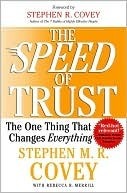More on this book
Community
Kindle Notes & Highlights
Read between
June 3 - June 11, 2019
There are three signs of a hypocrite: when he speaks he speaks lies, when he makes a promise he breaks it, and when he is trusted he betrays his trust. —MUHAMMAD
Trust men and they will be true to you; treat them greatly and they will show themselves great. —RALPH WALDO EMERSON
Leadership without mutual trust is a contradiction in terms. —WARREN BENNIS, AUTHOR OF ON BECOMING A LEADER
To increase organizational Integrity, you can create or improve your organizational mission or values statement, engaging everyone in the process to ensure that it’s more than just some platitude hanging on the wall. You can also work on creating a culture of making and keeping commitments within the organization. This is particularly important for leaders, and it’s especially important in the small things. I’ve known of situations where leaders did not take seemingly small commitments seriously, and it spread to the extent that before long, everyone was treating internal commitments lightly.
This is a big problem with our organization. We don't take our internal commitments seriously. Meetings get pushed back or cancelled with alarming frequency, and we don't keep our commitments to each other. I contribute to this when I over commit myself and when I don't call out others on their commitments.
Part of the problem might be that we are overcommiting ourselves, or that we are too optimistic about our time constraints. It could also simply be a matter of poor time management because we aren't using the tools at our disposal correctly.
In addition, you can create a culture in which people have the opportunity to account for results—not activities—on a regular basis.
[W]e’ve got a business principle that says, “Our assets are our people, our capital and our reputation.” And if any of those are diminished, the last one is the hardest one to regain. —HANK PAULSON, CHAIRMAN AND CEO, GOLDMAN SACHS
There is no rule more invariable than that we are paid for our suspicions by finding what we expected. —HENRY DAVID THOREAU
In extending trust, the general guideline is to extend trust conditionally to those who are earning it and abundantly to those who have already done so. Keep in mind that even when you extend trust abundantly, there should still always be accountability because that is a principle that actually enhances trust.
The number one job of any leader is to inspire trust. It’s to release the creativity and capacity of individuals to give their best and to create a high-trust environment in which they can effectively work with others. And this is true both at work and at home.
The weak can never forgive. Forgiveness is the attribute of the strong. —MAHATMA GANDHI
It is better to trust and sometimes be disappointed than to be forever mistrusting and be right occasionally. —NEAL A. MAXWELL, EDUCATOR AND RELIGIOUS LEADER


